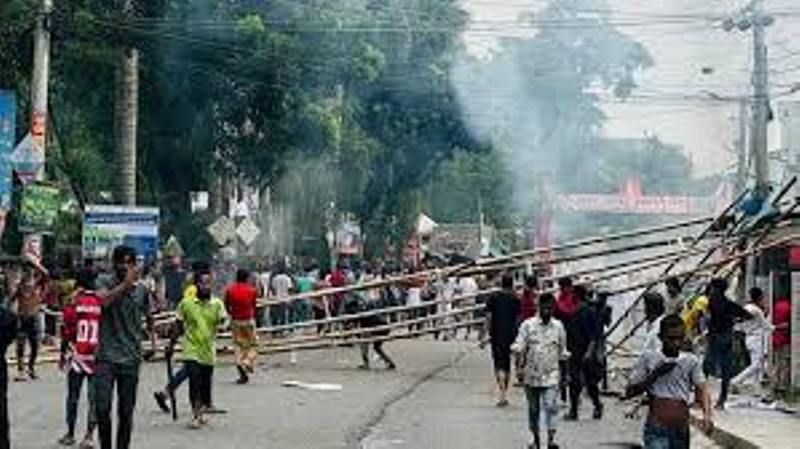On Tuesday of this week, Gopalganj lost a good number of her brave sons to organised anarchy.
Reports speak of as many as twenty individuals losing their lives when the army went into action against them.
And what was the fault of these people, indeed of the people of Gopalganj. Here is the answer to that question: in Gopalganj on Tuesday, it was People Power at work. Those twenty who have succumbed to atrocities are the newest martyrs in the history of Bangladesh, indeed in the new struggle to reclaim and uphold national history.
In these nearly twelve months since an unconstitutional regime was foisted on the nation, Bangladesh’s history, brought about by a strenuous War of Liberation in 1971, has been under calculated assault.
The assault, patronised and directed by elements who seized the state through the overthrow of the constitutional government of Prime Minister Sheikh Hasina, has done incalculable damage to the country.
On Tuesday, the people of Gopalganj hit back at fascism. And by hitting back at the rogue elements responsible for the systematic destruction of Bangladesh’s heritage, they sent out the unambiguous lesson that no enemy, internal or external, has or will have the right or the audacity to upend the historical legacy of the land. In these twelve months, Bangladesh’s people have suffered in myriad ways. Political leaders and workers have been carted off to prison; grassroots activists of the Awami League, indeed people swearing fealty by the principles ingrained in the War of Liberation, have been killed; hundreds of policemen have been murdered by gangs of bandits sustained by those who hold power through illegitimate means.
In these twelve months, actors and writers and civil servants and journalists have languished in prison for their loyalty to the republic. Mobs — and they are not only thugs organised on the streets but among the professional classes as well — have come together to assault victims of the Yunus regime on their way to court and within the premises of the court itself.
These mobs have forced changes in the judiciary, in the civil service, at universities and media houses.
So-called reform commissions have produced reports which have had a simple aim: drive all the values underpinning the nation’s history to ground, out of people’s lives.
In these twelve months, the home of the Father of the Nation, Bangabandhu Sheikh Mujibur Rahman, has been destroyed; structures and memorials dedicated to the sacrifices of three million Bengalis in defence of their land in 1971 have been demolished.
The unconstitutional regime has had the audacity to impose a ban on the nationalist slogan Joi Bangla; it has imposed a ban on the activities of the Awami League, the party which led the country to freedom; and with no shame or embarrassment it has had the Jamaat-e-Islami, infamous for its collaboration with the occupation Pakistan army, registered as a political party.
All these notorious acts have taken place under the watch of the existing unconstitutional regime.
The bigger truth is that all this destruction, all this repudiation of the rule of law, all this unabashed assault on history has had the approval, covert as well as overt, of the men and women who today call themselves Bangladesh’s government.
No security force, no soldiers took action against the vandals who have caused this landscape of destruction in the land. They stood by as monuments and homes and party offices were put to the torch.
On Tuesday, the people of Gopalganj hit back. And that hitting back was fundamentally the voice of a nation which simply is not ready to take any more nonsense from the brigands who have gone around turning the country into a wasteland in these twelve months.
In Gopalganj, under the protection of the unconstitutional regime, these elements, calling themselves a political party, which is but a king’s party, called forth the audacity to hurl insults at the Father of the Nation.
Their sinister goal would have gone further had the people of Gopalganj not raised their loud voice of protest. In the land which gave birth to Bangabandhu, the audacity of the enemies of the state did not go unchallenged. Gopalganj ran these sinister elements out of town. It did not matter that Gopalganj lost its young to martyrdom, to the dark forces of the NCP and the Jamaat-Shibir.
It mattered that these forces of anarchy not be allowed the liberty any more of desecrating the nation’s history. It mattered that all the roads leading to Tungipara, where Bangabandhu rests for all time, were closed off to these vandals who had thought they could do what they have done earlier elsewhere in the country.
People Power was at work. It was a powerful warning shot from the people of Gopalganj — that national dignity, that Bengali self-esteem, had no place for bulldozer politics anymore.
Images of the young turning into martyrs were reminders of the past — that no repression, no organised criminality could silence the voice of the people. Fascism will not go unchallenged.
They have imposed Section 144 in Gopalganj. They have clamped a curfew on the soil which takes pride in being Bangabandhu’s ancestral land. These measures have been tried earlier in history. They have not worked.
ALSO READ: Tajuddin Ahmad at 100: Celebrating Bangladesh’s intellectual powerhouse
There is nothing in history which speaks of People Power losing its battles and its wars and its political struggles against organised repression, against the forces of fascism.
In 1971, People Power was the brilliance of light given off by the spirited Joi Bangla song. In 2025, it is the same song that is being played out in Gopalganj and across the vast expanse of the People’s Republic of Bangladesh.















